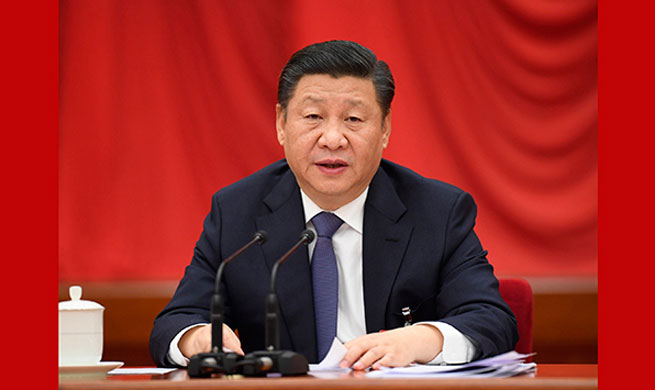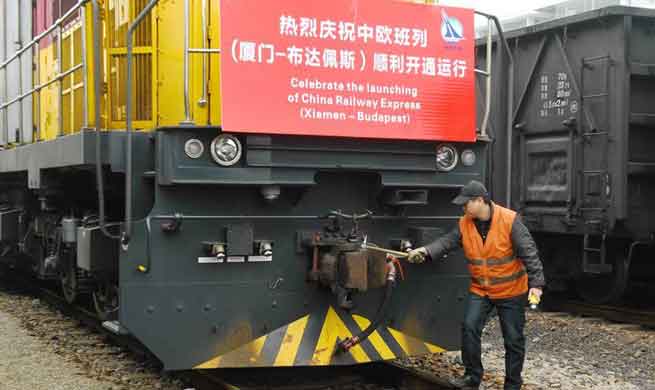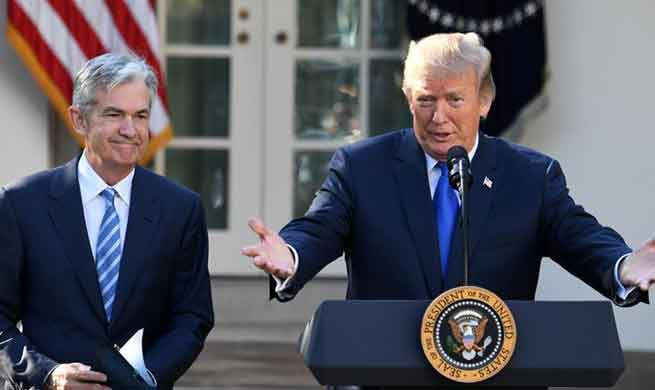BEIJING, Jan. 20 (Xinhua) -- U.S. President Donald Trump has totteringly completed his first year in office amid controversy, doubts and even criticism domestically and beyond.
The U.S. foreign policy under his administration has rattled world leaders' nerves for its uncertainty and volatility, and his America First policy featuring self-centeredness, short-sightedness and a lack of sense of responsibility has negatively affected other countries, and even the United States itself.
A SELF-SERVING PROFITEER
When applying Trump's America First idea, the United States in the first year of Trump's tenure has paid less attention than before to soft power leadership through downgrading the offering of public goods, among other moves.
Bong Young-shik, a research fellow at Yonsei Institute for North Korean Studies, told Xinhua that Trump's foreign policy is aimed at maximizing American interest, even at the cost of its allies.
Amid widespread condemnation from political leaders, business executives and environmentalists around the world, Trump abandoned the Paris climate agreement, citing its disadvantages for the United States, for example diminished benefits for American workers and less U.S. economic production.
Ignoring climate change and global efforts, Trump's America only focuses on its own short-term interest, while recklessly shirking its responsibility, and even damaging other countries' benefits and global sustainable development.
Dmitry Suslov, deputy director of the Center for Comprehensive European and International Studies at the National Research University Higher School of Economics, believed that "the U.S. administration in its foreign policy is doing what is profitable to the United States here and now."
It honors some agreements as "they will permit it to profit in the near and mid-term period," he said, adding that such profits include stimulating economic growth, preventing unemployment, reducing or stopping the production outsourcing to other countries and contributing to the maintenance of U.S. competitiveness.
ZERO-SUM MENTALITY
While withdrawing from some "unnecessary" spheres, the Trump administration has been devoting itself to increasing its military strength to maintain U.S. military supremacy, based on its old-fashioned zero-sum mentality.
In the National Security Strategy report released in December, China and Russia were listed by the Trump administration as "revision powers" that challenge the U.S. standing in the world.
Josef Braml, a research associate at the think-tank German Council on Foreign Relations, said "Trump's zero-thinking ... leads him to believe that America can only win by forcing others -- like Europe and China -- to lose."
Under the pretext of national security, the Trump administration last year launched an investigation into Chinese intellectual property and technology transfer and self-initiated probes into Chinese aluminum products as well as rejected China's market economy status in the World Trade Organization (WTO) to contain China's development.
Dan Mahaffee, senior vice president and director of policy at the Center for the Study of the Presidency and Congress, told Xinhua that the China-U.S. relationship is "one where the Trump administration will continue to be eager to push back."
Suslov said, "it (the United States) has maintained its concept of friends and foes, and made it sharper and more concrete."
The United States should know well that mutual benefits weigh more than differences in China-U.S. ties, and cooperation and dialogue should be the mainstay of bilateral relations.
CREATING CHAOS ABROAD
The Trump administration's foreign policy has brought uncertainties to the world. The role of multilateral cooperation and international institutions has been undermined while Trump has been wielding overwhelming power where he thought necessary.
With his obstructing and threatening to withdraw from the Iran nuclear deal, the international non-proliferation regime has suffered a setback, and regional peace and stability have been put into jeopardy.
Following Trump's decision to recognize Jerusalem as the Israeli capital, the peace prospect between Palestinians and Israel now seems more elusive than ever.
With his resistance to globalism, protectionism has been rising and the multi-trade regime has been undermined, which, although helping the U.S. economy rebound in the short term, will damage its economic growth prospect in the mid- and long term.
Braml took the international financing of the U.S. debt as an example, saying that it "would be seriously imperiled, if President Trump moved toward fulfilling his promises on trade, in particular protectionist measures highlighted during his campaign."
"If Trump wants to secure worldwide financing of the increasing U.S. debt, he would be well advised to openly trade with international partners," the expert said.
















